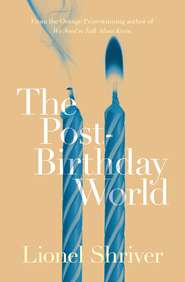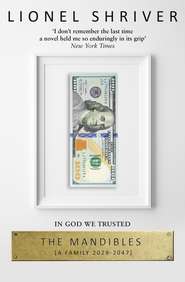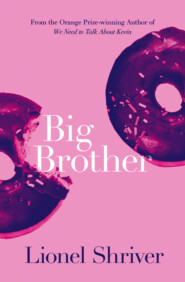По всем вопросам обращайтесь на: info@litportal.ru
(©) 2003-2024.
✖
A Perfectly Good Family
Автор
Год написания книги
2018
Настройки чтения
Размер шрифта
Высота строк
Поля
“True.” Mordecai granted his brother a perfunctory nod; Truman grunted.
“You lucked out with parking,” I chattered. “That army truck must take up at least two metres.”
Hee-hee, went Mordecai—his laughter, too, was prematurely aged, geezery and good-old-boy, from slumming with Tarheel construction workers who dropped out of high school. “Nope. Yellow lines all the way. Remember that Justice Department card Father kept on the dashboard of the Volvo? After his funeral, I swiped it.”
“I wondered what happened to that,” Truman muttered.
“I find that hard to credit,” I said. “The cops believing an army surplus troop transporter belongs to the Supreme Court.”
“Hey, it’s worked so far. Not a ticket for two years. Figured True here wouldn’t use it. That wouldn’t be right. That would be lying.”
The pavement was too narrow for the three of us to proceed abreast. I didn’t feel comfortable coupling clearly with one brother over the other, so trailed a bit behind the elder and a bit before the younger, our trio cutting a diagonal of birth-order down the walk.
“Man, I hope this Garrison character can shuffle paper fast.” Mordecai rubbed his hands. “I could sure use the cash.”
Truman rolled his eyes.
Hugh Garrison’s office was pastel and travel-postery, with a round table and straight-backs next to his desk. I was obscurely disappointed; in my imagination, we’d be seated at a long darkwood conference table, with portraits on the walls, emerald bankers’ lamps and heavy crimson drapes. I’d read too many murder mysteries.
Hugh shook hands and offered condolences about my mother. When he invited us to the table, Mordecai and Truman found themselves next to each other; Truman fussed with his pea coat and managed to insert me between them. “So what,” I said, “you read the will aloud to us?”
“Not unless you insist,” said Hugh, spreading over his chair and hiking his pants so the hairs above his socks showed. He was a rangy, casual man with a no-nonsense air. “I think I can give ya’ll the gist without the being-of-sound-mind-and-body nonsense.
“Now,” he began, spreading papers before him. “I guess your parents told you that their estate would be divided equally between the three kids. So I assume they also apprised you guys of their bequest to the ACLU?”
He must have looked up to find a wave of shock registering across all three faces.
“It’s thanks to the ACLU,” Truman grumbled, “that we never had a clean sponge.”
“Rubbish,” I said, recovering. “We’d have had a putrid sponge if they hadn’t donated a dime. A smelly sponge is a point of view.”
“All I know is that to Father,” said Truman, “the primary charity of non-profits was to take money off his hands. With the small fortune Father shoveled that ACLU outfit over the years we could have bought enough A&P eight-packs to wipe up the Atlantic Ocean.”
Hugh looked edgy. “Mean your folks never informed ya’ll that the American Civil Liberties Union was willed a quarter of their estate?”
“What?” said Truman and Mordecai at once, which may have been the only time in their lives they did something together.
I shot Hugh a droll smile. “The fourth child.”
“You said ‘estate’—” The words were strangling in Truman’s throat. “Does that include Heck-Andrews, or not?”
Hugh rubbed his temples. “’Fraid so. Last year your momma expressed second thoughts about keeping her house in this bequest, but she never put word-one in writing. Nobody figured her heart condition was so serious, and as usual—that’s the way people are with wills—there seemed all the time in the world to change her mind.”
“Could you testify in court—” Mordecai leaned forward “—that she intended to revise the will?”
“No, and besides, she’d been wavering. She wanted to do—”
“What Sturges would have wanted,” Truman recited.
“Bingo.”
“Let’s talk turkey,” Mordecai demanded, clicking the silver knobs of his bolo tie on the table top. “In round numbers, what’s the lowdown? Cut to the chase, bottom line.”
Hugh’s head tilted with a trace of dismay toward my older brother. I myself had never been sure whether to find Mordecai refreshingly down to earth or, as Averil would say, crass.
“’Sides the house? I’ve taken a gander at this portfolio, but couldn’t give you an exact figure. There’ll be penalties for liquidating long-term investments prematurely, and state taxes—”
“How much?” insisted Mordecai.
“Before deductions, ballpark? Round about $300,000. To be divided between the—four of you.” He smiled.
Mordecai fell back. “That’s all?”
“I know what it’s worth to me,” said Truman, “but on the market, what do you figure Heck-Andrews is worth?”
“Ya’ll’ll have to get it assessed. Off the cuff? House that size in Oakwood right now might list for three-eighty, maybe more. Fact, right downtown—Blount Street’s commercial zoning—you might get that much for the property alone. Course, they’d level the structure, maybe put up a—”
“NO!”
Truman would have been heard several offices down. Hugh looked mystified.
“Over my dead body,” Troom added. “But you’re telling me that the ACLU owns a quarter of my house. What am I supposed to do, run a bed and breakfast for bleeding-heart lawyers?” His eyebrows neared his hairline; his jaw clenched, its muscles dimpling in and out. In the pugnacious jutting of that chin, I recognized my father in court. “And what about the furniture? All those doodahs? Is the ACLU going to want my blender?”
“’Less your mom was collecting antiques—”
“Only the cheese,” I intruded.
“No art works?” he asked me.
“If that organization wants my fifth-grade clay elephant, they can have it.”
“Most household contents don’t assess at more than a few thousand bucks,” Hugh assured us. “On this point I bet we could convince the ACLU to ease up. It is, after all, a darned gracious bequest. And I bet a lot of your folks’ what-all has sentimental value.”
“Oh, absolutely,” said Mordecai.
“But they won’t forget the house?” Truman pleaded.
“Not a snowball’s chance. Too much do-re-mi. Oh, they’ll be nice about it—at first. But those fundraising boys are hungry. That it’s for a good cause only makes them more aggressive. They’re not ashamed of themselves. Not that shame usually holds anybody back anyways …”
“Is there no way to contest this?” Truman’s nostrils were flaring.
“Contest it!” Mordecai cried. “Come on, it’s got Mother and Father written all over it! Sanctimonious holier-than-thou liberal bullshit!”
“Father wanted to get to heaven,” I mumbled.
“Yeah, well,” said Mordecai, pursing his lips. “I’m surprised he didn’t give his place up there to a black handicapped dyke instead.”
Hugh was leaning back watching the show, and looked weary. Back when we had that beer it had been awkward at first, and I blurted that being an estate lawyer must be awfully dull. I guess that wasn’t a nice thing to say about someone’s profession, but I’d been thinking about my father’s calling, crusading against racism, in comparison. Hugh had said no you’d be surprised. Estate law’s sometimes more interesting than you’d like. You see a lot of— He’d cut himself short and said, well, it’s hard not to get cynical about people.











